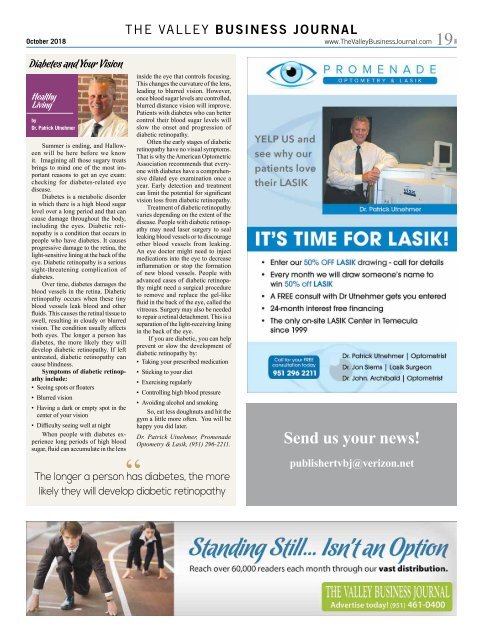VBJ October
Create successful ePaper yourself
Turn your PDF publications into a flip-book with our unique Google optimized e-Paper software.
<strong>October</strong> 2018<br />
Diabetes and Your Vision<br />
Healthy<br />
Living<br />
by<br />
Tina Dr. Patrick M. Gottlieb, Utnehmer D.C.<br />
Summer is ending, and Halloween<br />
will be here before we know<br />
it. Imagining all those sugary treats<br />
brings to mind one of the most important<br />
reasons to get an eye exam:<br />
checking for diabetes-related eye<br />
disease.<br />
Diabetes is a metabolic disorder<br />
in which there is a high blood sugar<br />
level over a long period and that can<br />
cause damage throughout the body,<br />
including the eyes. Diabetic retinopathy<br />
is a condition that occurs in<br />
people who have diabetes. It causes<br />
progressive damage to the retina, the<br />
light-sensitive lining at the back of the<br />
eye. Diabetic retinopathy is a serious<br />
sight-threatening complication of<br />
diabetes.<br />
Over time, diabetes damages the<br />
blood vessels in the retina. Diabetic<br />
retinopathy occurs when these tiny<br />
blood vessels leak blood and other<br />
fluids. This causes the retinal tissue to<br />
swell, resulting in cloudy or blurred<br />
vision. The condition usually affects<br />
both eyes. The longer a person has<br />
diabetes, the more likely they will<br />
develop diabetic retinopathy. If left<br />
untreated, diabetic retinopathy can<br />
cause blindness.<br />
Symptoms of diabetic retinopathy<br />
include:<br />
• Seeing spots or floaters<br />
• Blurred vision<br />
• Having a dark or empty spot in the<br />
center of your vision<br />
• Difficulty seeing well at night<br />
When people with diabetes experience<br />
long periods of high blood<br />
sugar, fluid can accumulate in the lens<br />
THE VALLEY BUSINESS JOURNAL<br />
www.TheValleyBusinessJournal.com<br />
inside the eye that controls focusing.<br />
This changes the curvature of the lens,<br />
leading to blurred vision. However,<br />
once blood sugar levels are controlled,<br />
blurred distance vision will improve.<br />
Patients with diabetes who can better<br />
control their blood sugar levels will<br />
slow the onset and progression of<br />
diabetic retinopathy.<br />
Often the early stages of diabetic<br />
retinopathy have no visual symptoms.<br />
That is why the American Optometric<br />
Association recommends that everyone<br />
with diabetes have a comprehensive<br />
dilated eye examination once a<br />
year. Early detection and treatment<br />
can limit the potential for significant<br />
vision loss from diabetic retinopathy.<br />
Treatment of diabetic retinopathy<br />
varies depending on the extent of the<br />
disease. People with diabetic retinopathy<br />
may need laser surgery to seal<br />
leaking blood vessels or to discourage<br />
other blood vessels from leaking.<br />
An eye doctor might need to inject<br />
medications into the eye to decrease<br />
inflammation or stop the formation<br />
of new blood vessels. People with<br />
advanced cases of diabetic retinopathy<br />
might need a surgical procedure<br />
to remove and replace the gel-like<br />
fluid in the back of the eye, called the<br />
vitreous. Surgery may also be needed<br />
to repair a retinal detachment. This is a<br />
separation of the light-receiving lining<br />
in the back of the eye.<br />
If you are diabetic, you can help<br />
prevent or slow the development of<br />
diabetic retinopathy by:<br />
• Taking your prescribed medication<br />
• Sticking to your diet<br />
• Exercising regularly<br />
• Controlling high blood pressure<br />
• Avoiding alcohol and smoking<br />
So, eat less doughnuts and hit the<br />
gym a little more often. You will be<br />
happy you did later.<br />
Dr. Patrick Utnehmer, Promenade<br />
Optometry & Lasik, (951) 296-2211.<br />
“<br />
The longer a person has diabetes, the more<br />
likely they will develop diabetic retinopathy<br />
Send us your news!<br />
publishertvbj@verizon.net<br />
19

















